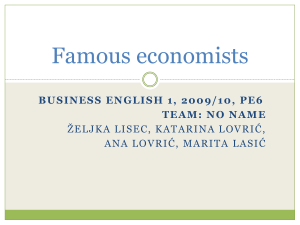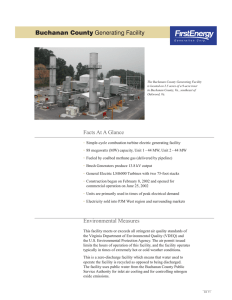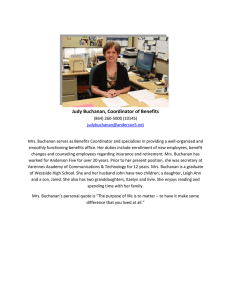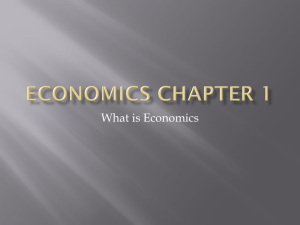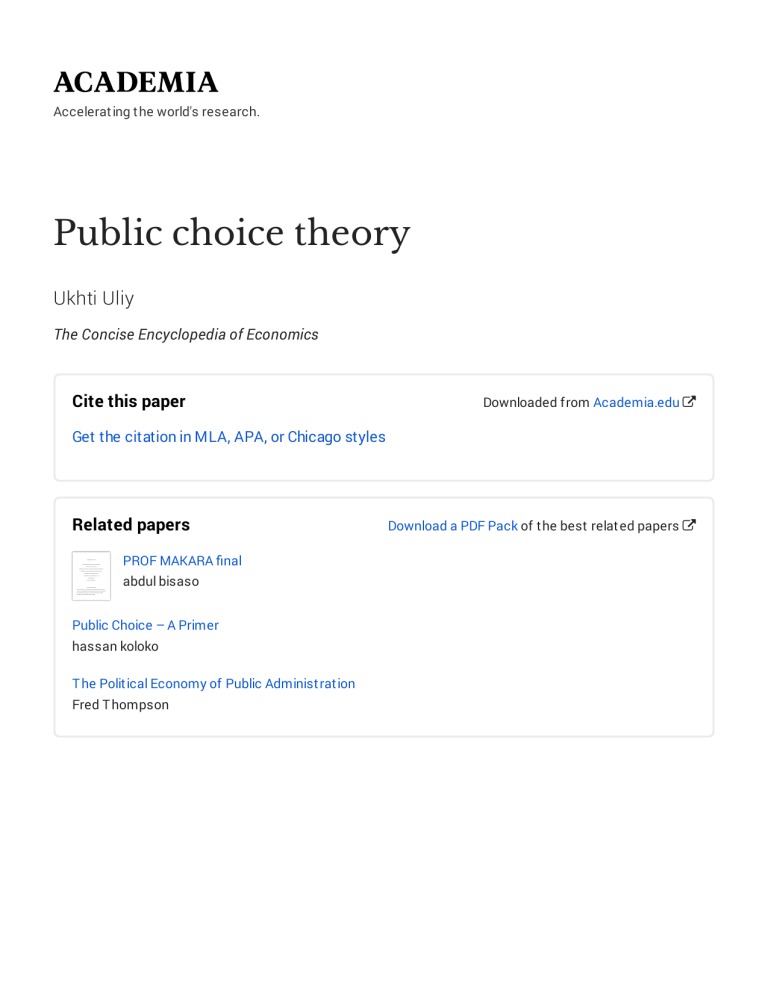
Accelerat ing t he world's research.
Public choice theory
Ukhti Uliy
The Concise Encyclopedia of Economics
Cite this paper
Downloaded from Academia.edu
Get the citation in MLA, APA, or Chicago styles
Related papers
PROF MAKARA final
abdul bisaso
Public Choice – A Primer
hassan koloko
T he Polit ical Economy of Public Administ rat ion
Fred T hompson
Download a PDF Pack of t he best relat ed papers
Public Choice Theory, by Jane S. Shaw: The Concise Encycloped...
http://www.econlib.org/library/Enc/PublicChoiceTheory.html
Search Site Search Card Catalog Search a Book
Home
Books
Encyclopedia
•Articles:
By Title
By Author
By Category
Biographies
Index
Cite this page
Articles
Topics
Public Choice Theory
by Jane S. Shaw
Public choice theory is a branch of economics
that developed from the study of taxation and
public spending. It emerged in the fifties and
received widespread public attention in 1986,
when James Buchanan, one of its two leading
architects (the other was his colleague Gordon
Tullock), was awarded the Nobel Prize in
economics. Buchanan started the Center for
Study of Public Choice at George Mason
University, and it remains the best-known locus
of public choice research. Others include Florida
State University, Washington University (St.
Louis), Montana State University, the California
Institute of Technology, and the University of
Rochester.
Data
Links
Quote of the
Day
Register for
Econlib News
About the
Econlib
Website
FAQ and Help
Public choice takes the same principles that
economists use to analyze people's actions in
the marketplace and applies them to people's
actions in collective decision making.
Economists who study behavior in the private
marketplace assume that people are motivated
mainly by self-interest. Although most people
base some of their actions on their concern for
others, the dominant motive in people's actions
in the marketplace—whether they are
employers, employees, or consumers—is a
concern for themselves. Public choice
economists make the same assumption—that
although people acting in the political
marketplace have some concern for others,
their main motive, whether they are voters,
politicians, lobbyists, or bureaucrats, is
self-interest. In Buchanan's words the theory
"replaces... romantic and illusory... notions
about the workings of governments [with]...
notions that embody more skepticism."
Jane S. Shaw
Supplements:
Growing
Skepticism
Further Reading
See also:
Arrow
Buchanan
Political Behavior
Political Behavior
Public Goods and
Externalities
Public Choice
Podcasts, hosted
by Russ Roberts
at EconTalk.
Jane Shaw
In the past many economists have argued that
the way to rein in "market failures" such as
monopolies is to introduce government action.
But public choice economists point out that
there also is such a thing as "government
failure." That is, there are reasons why
1 sur 7
22/08/08 10:37
!"#$%&'()*%&+',)+*-./'#.'012+'34'3)156',)+'(*2&%7+'82&.&$*9+:444
);;96<<5554+&*2$%#4*-=<$%#-1-.<82&<!"#$%&()*%&+,)+*-.4);>$
government)intervention)does)not)achieve)the)
desired)effect.)For)example,)the)Justice)
9epartment)has)responsibility)for)reducing)
monopoly)power)in)noncompetitive)industries.)
But)a)1?@3)study)by)William)F.)Long,)Richard)
Schramm,)and)Robert)Tollison)concluded)that)
actual)anti-competitive)behavior)played)only)a)
minor)role)in)decisions)by)the)Justice)
9epartment)to)bring)antimonopoly)suits.)
Instead,)they)found,)the)larger)the)industry,)the)
more)likely)were)firms)in)it)to)be)sued.)
Similarly,)Congress)has)frequently)passed)laws)
that)are)supposed)to)protect)people)against)
environmental)pollution.)But)Robert)Crandall)
has)shown)that)congressional)representatives)
from)northern)industrial)states)used)the)1?@@)
Clean)Air)Act)amendments)to)reduce)
competition)by)curbing)economic)growth)in)the)
Sunbelt.)The)amendments)required)tighter)
emissions)standards)in)undeveloped)areas)than)
in)the)more)developed)and)more)polluted)
areas,)which)tend)to)be)in)the)East)and)
Midwest.
One)of)the)chief)underpinnings)of)public)choice)
theory)is)the)lack)of)incentives)for)voters)to)
monitor)government)effectively.)Anthony)
9owns,)in)one)of)the)earliest)public)choice)
books,)!"#$%&"&'(%#)*+&,-#&.#/+'&%,0%-1
pointed)out)that)the)voter)is)largely)ignorant)of)
political)issues)and)that)this)ignorance)is)
rational.)Even)though)the)result)of)an)election)
may)be)very)important,)an)individualPs)vote)
rarely)decides)an)election.)Thus,)the)direct)
impact)of)casting)a)well-informed)vote)is)
almost)nil;)the)voter)has)virtually)no)chance)to)
determine)the)outcome)of)the)election.)So)
spending)time)following)the)issues)is)not)
personally)worthwhile)for)the)voter.)Evidence)
for)this)claim)is)found)in)the)fact)that)public)
opinion)polls)consistently)find)that)less)than)
half)of)all)voting-age)Americans)can)name)their)
own)congressional)representative.
Public)choice)economists)point)out)that)this
incentive)to)be)ignorant)is)rare)in)the)private
sector.)Someone)who)buys)a)car)typically)wants
to)be)well)informed)about)the)car)he)or)she
selects.)That)is)because)the)car)buyerPs)choice
is)decisiveShe)or)she)pays)only)for)the)one
chosen.)If)the)choice)is)wise,)the)buyer)will
benefit;)if)it)is)unwise,)the)buyer)will)suffer
directly.)Voting)lacks)that)kind)of)direct)result.
Therefore,)most)voters)are)largely)ignorant
about)the)positions)of)the)people)for)whom
they)vote.)Except)for)a)few)highly)publicized
issues,)they)do)not)pay)a)lot)of)attention)to
what)legislative)bodies)do,)and)even)when)they
2'7"-'@
22<0B<0B'106D@
!"#$%&'()*%&+',)+*-./'#.'012+'34'3)156',)+'(*2&%7+'82&.&$*9+:444
);;96<<5554+&*2$%#4*-=<$%#-1-.<82&<!"#$%&()*%&+,)+*-.4);>$
do pay attention, they have little incentive to
gain the background knowledge and analytic
skill needed to understand the issues.
Public choice economists also examine the
actions of legislators. Although legislators are
expected to pursue the =public interest,= they
make decisions on how to use other people's
resources, not their own. Furthermore, these
resources must be provided by taxpayers and
by those hurt by regulations whether they want
to provide them or not. Politicians may intend
to spend taxpayer money wisely. Efficient
decisions, however, will neither save their own
money nor give them any proportion of the
wealth they save for citizens. There is no direct
reward for fighting powerful interest groups in
order to confer benefits on a public that is not
even aware of the benefits or of who conferred
them. Thus, the incentives for good
management in the public interest are weak. In
contrast, interest groups are organized by
people with very strong gains to be made from
governmental action. They provide politicians
with campaign funds and campaign workers. In
return they receive at least the =ear= of the
politician and often gain support for their goals.
In other words, because legislators have the
power to tax and to extract resources in other
coercive ways, and because voters monitor
their behavior poorly, legislators behave in
ways that are costly to citizens. One technique
analyzed by public choice is log rolling, or vote
trading. An urban legislator votes to subsidize a
rural water project in order to win another
legislator's vote for a city housing subsidy. The
two projects may be part of a single spending
bill. Through such log rolling both legislators get
what they want. And even though neither
project uses resources efficiently, local voters
know that their representative got something
for them. They may not know that they are
paying a pro-rata share of a bundle of
inefficient projectsH And the total expenditures
may well be more than individual taxpayers
would be willing to authorize if they were fully
aware of what is going on.
In addition to voters and politicians, public
choice analyzes the role of bureaucrats in
government. Their incentives explain why many
regulatory agencies appear to be =captured= by
special interests. (The =capture= theory was
introduced by the late George Stigler, a Nobel
Laureate who did not work mainly in the public
choice field.) Capture occurs because
bureaucrats do not have a profit goal to guide
? sur @
22<08<08 10:?@
!"bli& ()oi&e T)eor., b. 0ane S4 S)aw: T)e (on&ise 8n&.&lo9e:444
);;9:<<www4e&onlib4org<librar.<8n&<!"bli&()oi&eT)eor.4);ml
!"#$% '#"()$*%+ ,-.!#(/0 !"#1 2.2(331 (%# $4*)#%-5#-! '#6(2.# !"#1 "()# ( 4*(3 *%
5$..$*-+ 7"#1 %#31 *- 8*-4%#.. 9*% !"#$%
'2/4#!.0 (-/ *9!#- !"# :#*:3# ;"* ;$33 '#-#9$!
9%*5 !"#$% 5$..$*- 6(- $-932#-6# 8*-4%#.. !*
:%*)$/# 5*%# 92-/.+ 7"2. $-!#%#.! 4%*2:.<;"*
5(1 '# (. /$)#%.# (. 3*''1$.!. 9*% %#423(!#/
$-/2.!%$#. *% 3#(/#%. *9 #-)$%*-5#-!(3
4%*2:.<'#6*5# $5:*%!(-! !* !"#5+ =26"
$-!#%%#3(!$*-."$:. 6(- 3#(/ !* '2%#(26%(!. '#$-4
6(:!2%#/ '1 $-!#%#.! 4%*2:.+
>3!"*24" :2'3$6 6"*$6# #6*-*5$.!. "()# 9*62.#/
5*.!31 *- (-(31?$-4 4*)#%-5#-! 9($32%#0 !"#1
(3.* "()# .244#.!#/ ;(1. !* 6*%%#6! :%*'3#5.+
@*% #A(5:3#0 !"#1 (%42# !"(! $9 4*)#%-5#-!
(6!$*- $. %#B2$%#/0 $! ."*23/ !(C# :3(6# (! !"#
3*6(3 3#)#3 ;"#-#)#% :*..$'3#+ D#6(2.# !"#%#
(%# 5(-1 3*6(3 4*)#%-5#-!.0 (-/ '#6(2.#
:#*:3# E)*!# ;$!" !"#$% 9##!0E !"#%# $.
6*5:#!$!$*- (5*-4 3*6(3 4*)#%-5#-!.0 (. ;#33
(. .*5# #A:#%$5#-!(!$*-+ 7* .!%#(53$-#
'2%#(26%(6$#.0 F*%/*- 7233*6C (-/ G$33$(5
H$.C(-#- "()# %#6*55#-/#/ (33*;$-4 .#)#%(3
'2%#(2. !* .2::31 !"# .(5# .#%)$6# *- !"#
4%*2-/. !"(! !"# %#.23!$-4 6*5:#!$!$*- ;$33
$5:%*)# #99$6$#-61+ @*%#.! #6*-*5$.! I(-/(3
JK7**3# %#6*55#-/. !"(! !"# @*%#.! =#%)$6#
6"(%4# "$C#%. (-/ '(6C:(6C#%. 5*%# !"(- !*C#9##. !* 2.# !"# 9*%#.!.+ 7"$.0 "# (%42#.0 ;$33
3#(/ @*%#.! =#%)$6# :#%.*--#3 !* :(1 5*%#
(!!#-!$*- !* %#6%#(!$*- (-/ %#/26# 3*44$-4 $(%#(. !"(! (%# (!!%(6!$)# !* -(!2%# 3*)#%.+ >-/
I*/-#1 @*%! (-/ L*"- D(/#- "()# .244#.!#/
!"# 6%#(!$*- *9 ( E:%#/(!*%1 '2%#(2E ;"*.#
5$..$*- $. !* %#/26# !"# '2/4#!. *9 *!"#%
(4#-6$#.0 ;$!" $!. $-6*5# /#:#-/$-4 *- $!.
.266#..+
M2'3$6 6"*$6# #6*-*5$.!. "()# (3.* !%$#/ !*
/#)#3*: %23# 6"(-4#. !"(! ;$33 %#/26# 3#4$.3(!$*!"(! 6(!#%. !* .:#6$(3 $-!#%#.!. (-/ 3#(/. !*
#)#%N#A:(-/$-4 4*)#%-5#-! #A:#-/$!2%#.+ ,!"# 3(!# #$4"!$#. L(5#. 8+ O$33#%0 ( :2'3$6
6"*$6# .6"*3(% ;"* "#(/#/ !"# J99$6# *9
O(-(4#5#-! (-/ D2/4#! /2%$-4 !"# I#(4(>/5$-$.!%(!$*-0 "#3:#/ :(.. !"#
F%(55NI2/5(- 3(;0 ;"$6" .#! ( 3$5$! *(--2(3 .:#-/$-4 (-/ '(6C#/ $! ;$!" (2!*5(!$6
62!. $9 !"# 6#$3$-4 ;(. -*! 5#!+ 7"# 3(; "(/ (!
3#(.! ( !#5:*%(%1 #99#6! $- .3*;$-4 .:#-/$-4+
=2::*%! 9*% !#%5 3$5$!. (-/ 9*% ( 3$-#N$!#5 )#!*
(3.* %#93#6!. !"# :2'3$6 6"*$6# )$#; !"(!
(//$!$*-(3 3#4$.3(!$)# %23#. (%# -##/#/ !* 3$5$!
3*4%*33$-4 (-/ !"# :*;#% *9 .:#6$(3 $-!#%#.!.+
M2'3$6 6"*$6# .6"*3(%.0 "*;#)#%0 /* -*!
-#6#..(%$31 (4%## *- !"# :*!#-!$(3 #99#6!$)#-#..
*9 .:#6$9$6 %23#.+
4 s"r @
22<0C<0C 10:E@
!"#$%& ()*%&+ ,)+*-./ #. 012+ 34 3)156 ,)+ (*2&%7+ 82&.&$*9+:444
);;96<<5554+&*2$%#4*-=<$%#-1-.<82&<!"#$%&()*%&+,)+*-.4);>$
!"#$%&"'()'*+&'&,"-+*#*&.'$/(%+'+0"'&%--(&"123'
/"4*54'4$+%6"'()'5(7"64."4+8'-%/2*#'#0(*#"'*&'
&(."+*."&'7*"9"1'$&'$'#(4&"67$+*7"'(6'
2*/"6+$6*$4'/6$4#0'()'"#(4(.*#&8'$&'(--(&"1'+('
.(6"':2*/"6$2:';+0$+'*&8'*4+"67"4+*(4*&+<'9*45&'
&%#0'$&'="34"&*$4'"#(4(.*#&>'?0*&'*&'-$6+23'
#(66"#+>'?0"'"."65"4#"'()'-%/2*#'#0(*#"'
"#(4(.*#&'6")2"#+&'1*&&$+*&)$#+*(4'9*+0'+0"'
*.-2*#*+'$&&%.-+*(48'0"21'/3'="34"&*$4&8'
$.(45'(+0"6&8'+0$+'5(7"64."4+'"))"#+*7"23'
#(66"#+&'.$6,"+')$*2%6"&>
!%+'4(+'$22'-%/2*#'#0(*#"'"#(4(.*&+&'$6"'
#(4&"67$+*7"&'(6'2*/"6+$6*$4&>'@$4#%6'A2&(4'*&'
$4'*.-(6+$4+'#(%4+"6"B$.-2">'A2&(4'*&',4(94'
*4'-%/2*#'#0(*#"')(6'0*&'-$+0C/6"$,*45'/((,'!"#$
%&'()$&*$+&,,#)-(.#$/)-(&01'*4'90*#0'0"'-(*4+"1'
(%+'+0$+'2$65"'*4+"6"&+'56(%-&'0$7"'+6(%/2"'
5$*4*45'$41'.$*4+$*4*45'+0"'&%--(6+'()'+0(&"'
90('/"4")*+')6(.'+0"*6'2(//3*45>'?0$+'*&'
/"#$%&"'*+'*&'"$&3')(6'*41*7*1%$2&'+(':)6""C6*1":'
(4'+0"'"))(6+&'()'(+0"6&'*)'+0"3'/"4")*+'
$%+(.$+*#$223')6(.'+0(&"'"))(6+&>'?0$+'*&'9038'
A2&(4'"B-2$*4"18'4*4"+""4+0C#"4+%63')$6."6&D'
56(%-&8'90*#0'9"6"'(65$4*E"1'+('/"'-(2*+*#$2'
2(//3*45'56(%-&8'$2&('&(21'*4&%6$4#"'$41'(+0"6'
&"67*#"&>'?0"&"'-6(7*1"1'$'1*6"#+'*4#"4+*7"')(6'
+0"'*41*7*1%$2')$6."6'+('&+$3'*47(27"1>';F&'+0"'
4%./"6'()')$6."6&'0$&'1"#2*4"1'*4'6"#"4+'
1"#$1"&8'+0"3'0$7"'/"#(."'.(6"'-(2*+*#$223'
-(9"6)%28'$4'(/&"67$+*(4'+0$+'&%--(6+&'A2&(4D&'
#(4+"4+*(4><
@(6"'6"#"4+238'A2&(4'96(+"'!"#$2(3#$405$
6#),(0#$&*$74-(&031'90*#0'#(4#2%1"&'+0$+'
G"6.$43'$41'H$-$4'+06*7"1'$)+"6'I(621'I$6'JJ'
/"#$%&"'+0"'9$6'1"&+6(3"1'+0"'-(9"6'()'&-"#*$2'
*4+"6"&+&'+('&+*)2"'"4+6"-6"4"%6&0*-'$41'
"#(4(.*#'"B#0$45">'!%+'A2&(4'&+*22')$7(6&'$'
&+6(45'5(7"64."4+>
@$43'-%/2*#'#0(*#"'"#(4(.*&+&'+$,"'4('-(2*+*#$2
(6'*1"(2(5*#$2'-(&*+*(4>'K(."'/%*21')(6.$2
.$+0".$+*#$2'.(1"2&'()'7(+*45'&+6$+"5*"&'$41
$--23'5$."'+0"(63'+('%41"6&+$41'0(9'-(2*+*#$2
#(4)2*#+&'$6"'6"&(27"1>'L#(4(.*&+&'$+'+0"
M$2*)(64*$'J4&+*+%+"'()'?"#04(2(538')(6'"B$.-2"8
0$7"'-(*4+"1'(%+'+0$+':$5"41$C&"++*45:N+0$+'*&8
*1"4+*)3*45'+0"'(-+*(4&'+0$+'7(+"6&'#0((&"')6(.8
$41'"7"4'&-"#*)3*45'+0"'(61"6'()'7(+*45'(4'+0"
(-+*(4&N#$4'*4)2%"4#"'-(2*+*#$2'(%+#(."&>'?0*&
"B-2$*4&'+0"'6(2"'()'*4*+*$+*7"&'$41'6")"6"41$'$&
9$3&')(6'7(+"6&'+('&"+'$5"41$&8'(-"4*45'%(-+*(4&'+0$+'2"5*&2$+%6"&'(+0"69*&"'9(%21'*54(6"
(6'7(+"'1(94>
K(."'()'+0"&"'"#(4(.*&+&'0$7"'1"7"2(-"1'$'
? 7"- @
AA<BC<BC DB6E@
!"#$%& ()*%&+ ,)+*-./ #. 012+ 34 3)156 ,)+ (*2&%7+ 82&.&$*9+:444
);;96<<5554+&*2$%#4*-=<$%#-1-.<82&<!"#$%&()*%&+,)+*-.4);>$
separate and quite mathematical discipline
known as "social choice." Social choice traces
its roots to early work by Nobel Prize-winning
economist Kenneth Arrow. Arrow's 1951 book,
!"#$%& ()"$#* %+, -+,$.$,/%& 0%&/*12 attempted
to figure out through logic whether people who
have different goals can use voting to make
collective decisions that please everyone. He
concluded that they cannot, and thus his
argument is called the "impossibility theorem."
In addition to providing insight into how public
decision making occurs today, public choice
analyzes the rules that guide the collective
decision-making process itself. These are the
constitutional rules that are made before
political activity gets underway. Consideration
of these rules was the heart of 3)* (%&#/&/1 "4
("+1*+52 by James Buchanan and Gordon
Tullock, one of the classics of public choice.
Buchanan and Tullock began with the view that
a collective decision that is truly just—that is, a
decision in the public interest—would be one
that all voters would support unanimously.
While unanimity is largely unworkable in
practice, the book effectively challenged the
widespread assumption that majority decisions
are inherently fair. The approach reflected in
3)* (%&#/&/1 "4 ("+1*+5 has led to a further
subdiscipline of public choice, "constitutional
economics," which focuses exclusively on the
rules that precede parliamentary or legislative
decision making and limit the domain of
government.
!"#$%&%'(&!$%'#)
Jane S. Shaw is a senior associate at the
Political Economy Research Center in Bozeman,
Montana. She was formerly associate
economics editor with 6/1$+*11 7**8.
*$)%'()&+(,-./0
!"#$%&%&'()%*+,(-.'(%&/(012/1&(3"441#5.(!"#$%&'()')*$+,$
%+-*#-./(6789.
:1;&,'(<&=$1&>.(0-$1(+-+23($!"#+45$+,$6#2+(4&(5/
67?@.
0;%2=&+>'()%*+,(:.'(%&/(AB#$%2/(C.(D=21"E.(1(+-+23(*7$
8439&.#$ &-:$ 8);'3($ %"+3(#<(8=$(+/.(F,E+#B%44>(#$%E,.(G'(HI.(
6779.
0;%2=&+>'()%*+,(:.'(%&/(AB#$%2/(F.(J%K&+2'(+/,.(8);'3($
%"+3(#$&-:$%+-*.3.).3+-&'$1(+-+23(*/(67LL.
6 sur 7
22/08/08 10:37
!"#$%& ()*%&+ ,)+*-./ #. 012+ 34 3)156 ,)+ (*2&%7+ 82&.&$*9+:444
);;96<<5554+&*2$%#4*-=<$%#-1-.<82&<!"#$%&()*%&+,)+*-.4);>$
Henderson, David R. "James Buchanan and Company."
Reason (November 1987): 37-43.
Growing Skepticism
One sure sign of the impact of a school of thought
is whether and how it shows up in popular
textbooks. By that criterion public choice thinking
has had a big impact. Consider the famous
textbook by noted MIT economist and Nobel Prize
winner Paul Samuelson. In the book's early
editions, starting in 1948, Samuelson showed little
skepticism about the efficacy of government
solutions. But by 1985 Samuelson's text,
coauthored with Yale University's William Nordhaus,
had become more critical of government. Their
skepticism was explicitly based on public choice
reasoning. Indeed, in "Public Choice," an
eleven-page section of the 1985 text, they explain
some of the points made in this article. "Often,"
they write, "a logrolling process may end up as a
redistributive scheme, where the winning coalition
takes a bad initial proposal, and loads it with
enough provisions that appeal to special-interest
groups, until a solid majority has been obtained for
a legislative dog." Samuelson and Nordhaus
conclude: "Before we race off to our federal, state,
or local legislature, we should pause to recognize
that there are government failures as well as
market failures." [Italics theirs.]
—DRH
Return to top
Copyright: Design and coding ©: 1999-2002, Liberty Fund, Inc.
Content ©: 1993, 2002 David R. Henderson. All rights reserved.
The cuneiform inscription in the logo is the earliest-known written appearance of the word "freedom" (amagi),
or "liberty." It is taken from a clay document written about 2300 B.C. in the Sumerian city-state of Lagash.
Photo courtesy of author.
The URL for this site is: http://www.econlib.org. Please direct questions or comments about the website to
webmaster@econlib.org.
7 sur 7
22/08/08 10:37
